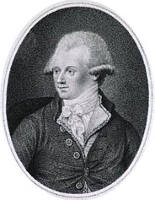
WILLIAM PERFECT was probably born in Bicester in 1737. His father became vicar of East Malling in 1742. From 1756 the family was resident in West Malling High Street. William married three times and fathered ten children.
In November 1749 William Perfect became apprenticed to William Everred, a surgeon in London. He also studied under Colin McKenzie who was a strong advocate against the practice of wearing swords and cloaks at births! By 1757 he was practising in West Malling referring to himself as Surgeon, Apothecary and Man-Midwife. His studies and subsequent books show he was at the forefront of the new medical interest in Mid-Wifery.
Perfect was also a noteworthy poet of the period. His poetry was first published in Martin’s Magazine 1755.
In 1765 Perfect became a Freemason despite the French Revolution creating public suspicion of the organisation. By Royal Patent of the Prince of Wales he was appointed in 1795 as Provincial Grand Master of the Provincial Grand Lodge of Kent.
His second child, Sarah, went on to marry Sylvester Harding, a well-known miniaturist painter at the time whose work is still famous today, and London’s National Portrait Gallery once staged a retrospective exhibition of his work.
William Perfect died in 1809 was buried in the tomb he constructed in East Malling Churchyard. His triple oak and lead coffin was brought at midnight from West Malling by torchlight in a cortege drawn by black horses.
Medical
Perfect wrote articles on autopsies such as the examination of the body of a woman who died after eating a large quantity of cucumbers! His first medical book Methods of Cure in Some Particular Cases of Insanity was published 1778 and Cases in Mid-Wifery, two volumes, 1781 and 1783. These books are of great interest to social historians as they show the social care systems in place and details of local conditions in 18th century West Malling.
He wrote against the practice of flinging corpses of hanged men into a common pit and tried to relieve the conditions for prisoners.
Inoculation against Smallpox was introduced into England in 1721 with great suspicion. In 1761 Perfect was advertising inoculation and with Dr Porter inoculated much of Kent, and orchestrated inoculation over a large part of England. He inoculated thousands from his home.
By 1770 he was well known for his advanced care of the mentally ill, and in 1774 was licensed to care for up to ten patients in his own home with his family of ten children. He wrote on humane care systems. Later he bought two other High Street houses.
In 1783 he became an MD, then a member of The London Medical Society in 1795 with a consultancy in the Strand. With his son he was probably a founder of The Benevolent Society for The Relief of Widows and Orphans of Medical Men in Kent.
Literary
Perfect’s poetry was first published in Martin’s Magazine 1755. He wrote political articles such as his support of William Pitt’s plea for mercy for Admiral Byng, and contributed to publications including The Westminster Journal, Gentleman’s Magazine, Mechell’s Chronicle and Shrubs of Parnasses to which Samuel Johnson and Garrick were subscribers. In 1757 he began the first of nine folio books. His sharp and witty descriptions of West Malling people, the contents of his friends shop, the Bear Pub (now The Farmhouse), and long poem about life and the seasons in West Malling open a unique “time window”, as does his book Bavin of Bays.
Although never a wealthy man, William Perfect was friends with many of the aristocratic families of Kent and also Francis Honeywood the “restorer” of Malling Abbey. He acted in plays at the Assembly Rooms and played cricket.
10 Best Lane Canterbury Kent CT1 2JB






